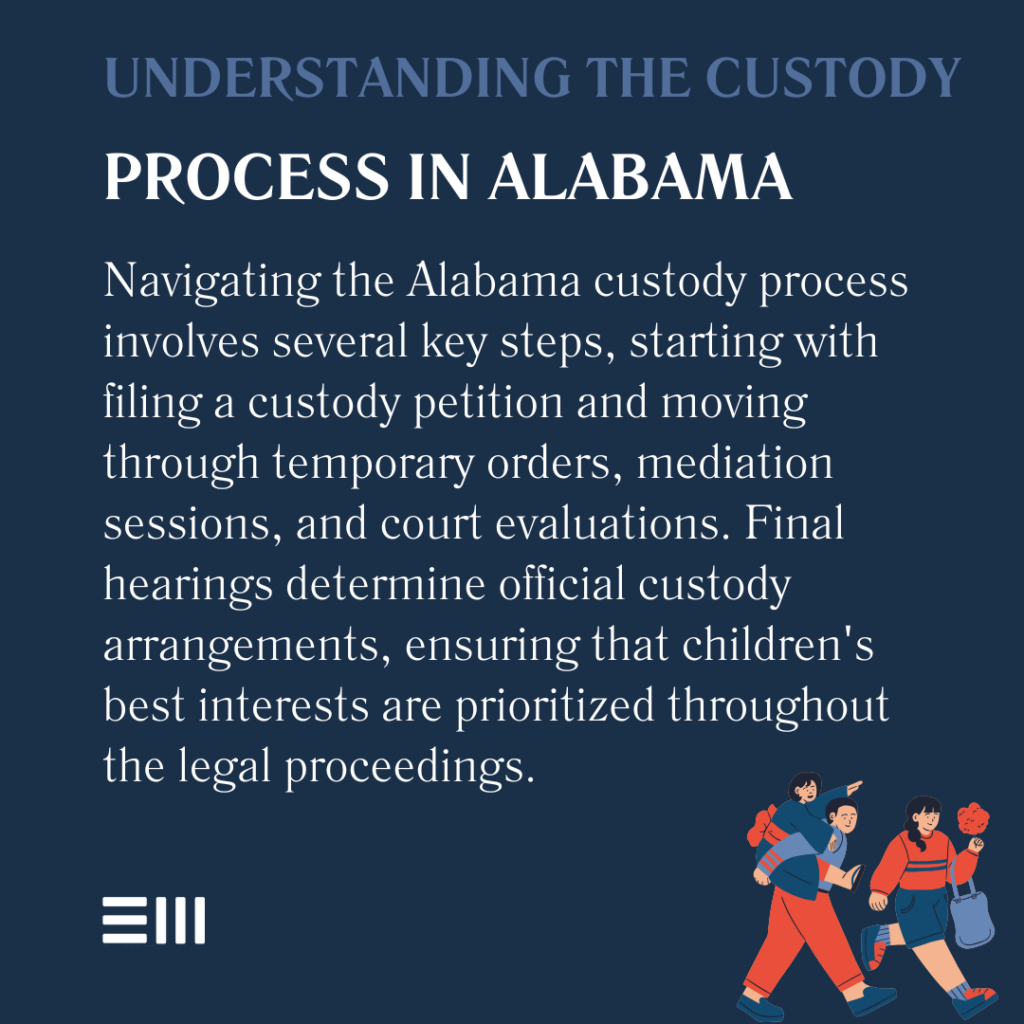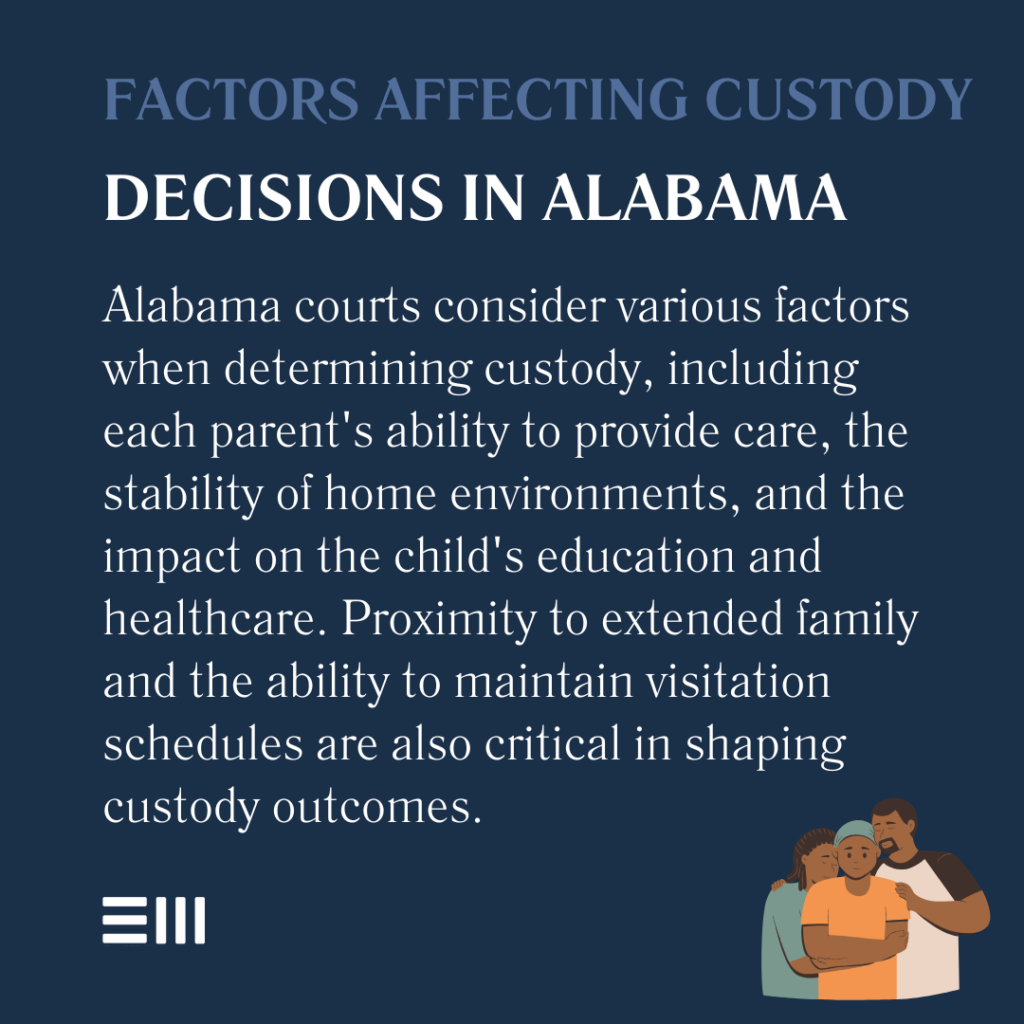
Behind every child custody case lies a family navigating one of life’s most challenging transitions.
In Alabama courtrooms each day, parents work to build new frameworks for raising their children across separate households, transforming traditional family dynamics into arrangements that continue to nurture and support their children’s growth.
Understanding Child Custody Rights
Parents navigating custody matters in Alabama face unique challenges as they work to secure their children’s well-being.
Alabama courts recognize multiple custody arrangements, each designed to serve the best interests of the child while maintaining meaningful relationships with both parents.
Key custody options include:
- Physical Custody: Primary caregiving responsibility and the right to have the child live in your home, which can be shared between parents or granted primarily to one parent.
- Legal Custody: Decision-making authority over education, healthcare, religious upbringing, and other major life choices, often awarded jointly to encourage cooperative parenting.
- Joint Custody: Shared arrangements where both parents maintain significant roles in their children’s lives, requiring effective communication and coordination.
- Sole Custody: Arrangements where one parent holds primary responsibility, typically reserved for situations involving safety concerns or special circumstances.
- Bird’s Nest Custody: An innovative arrangement where children remain in the family home while parents alternate residing there, minimizing disruption to children’s routines.
These arrangements form the foundation for creating stable, nurturing environments for children of separated parents.
The Alabama Custody Process
The journey through Alabama’s custody system involves several key steps designed to protect children’s interests while ensuring fair treatment of all parties involved.
Essential elements of the process include:
- Initial Filing: Submitting custody petitions and required documentation to the appropriate county court.
- Temporary Orders: Establishing interim arrangements to maintain stability during legal proceedings.
- Mediation Sessions: Working with professional mediators to find mutually acceptable solutions.
- Court Evaluations: Professional assessments of family dynamics and children’s needs.
- Judge Conferences: Private meetings to discuss case specifics and potential resolutions.
- Final Hearings: Formal proceedings where custody arrangements are officially determined.
Understanding these steps helps parents prepare effectively for their custody journey.

Common Questions About Child Custody in Alabama
Every custody situation brings unique challenges and concerns.
These answers provide clarity on frequent questions raised by Alabama parents seeking custody arrangements.
How Do Courts Determine the Best Interests of the Child?
Courts evaluate multiple factors, including each parent’s ability to provide care, existing relationships, stability of home environments, and the child’s educational and emotional needs.
What Rights Do Grandparents Have in Alabama?
Alabama law recognizes limited grandparent visitation rights, particularly when such contact serves the child’s best interests and maintains important family bonds.
Can I Modify an Existing Custody Order?
Modifications require demonstrating substantial changes in circumstances affecting the child’s well-being, such as relocation, changes in work schedules, or safety concerns.
How Does Relocation Impact Custody?
Parents must notify other parties before moving more than 60 miles away, allowing time for custody modifications or objections to be filed.
What Age Can Children Choose Which Parent to Live With?
While courts consider children’s preferences, no specific age guarantees a child’s choice will be decisive. Judges evaluate maturity and reasoning alongside other factors.
How Are Holidays and Special Events Handled?
Parents typically create detailed schedules addressing holidays, birthdays, and school breaks, often alternating these special times yearly.
What if the Other Parent Violates the Custody Order?
Courts provide enforcement mechanisms, including contempt proceedings and modifications to existing orders, when violations occur.
Factors Affecting Custody Decisions
Alabama courts carefully weigh numerous elements when determining custody arrangements. Understanding these factors helps parents present their cases effectively.
Important considerations include:
- Parental Fitness: Each parent’s ability to provide proper care and guidance.
- Home Environment: Stability and safety of each proposed living situation.
- School Continuity: Impact on children’s educational progress and relationships.
- Extended Family: Proximity to supportive family members and community ties.
- Healthcare Access: Availability of medical care and special needs support.
- Transportation: Ability to facilitate visitation and maintain schedules.
- Work Flexibility: Parents’ availability for daily care and activities.
These factors shape the court’s ultimate decisions about custody arrangements.

Creating Effective Parenting Plans
Well-structured parenting plans provide clear guidelines for co-parenting success. Thoughtful planning helps prevent conflicts and ensures children’s needs remain the primary focus.
Essential plan components include:
- Regular Visitation Schedules: Clear timing for weekday and weekend parenting time.
- Holiday Arrangements: Specific plans for special occasions and school breaks.
- Communication Methods: Agreed-upon ways to share information about children.
- Decision-Making Protocols: Processes for handling major choices about education and health.
- Transportation Details: Clear responsibilities for exchanges and travel arrangements.
- Emergency Procedures: Plans for handling unexpected situations or schedule changes.
- Expense Sharing: Agreements about cost division for activities and special needs.
Comprehensive planning supports successful co-parenting relationships.
Financial Considerations in Custody Cases
Managing the financial aspects of child custody arrangements requires careful planning and clear agreements. Understanding these elements helps parents prepare for both immediate and long-term obligations.
Key financial aspects include:
- Child Support Calculations: Understanding Alabama’s formula for determining support amounts based on income and custody time.
- Healthcare Coverage: Requirements for maintaining medical insurance and sharing uncovered expenses.
- Educational Expenses: Agreements for handling school fees, supplies, and future college costs.
- Extracurricular Activities: Cost-sharing arrangements for sports, clubs, and other activities.
- Tax Implications: Understanding dependent claims and related tax benefits.
- Travel Expenses: Division of costs for long-distance visitation or vacation travel.
- Special Needs Planning: Financial preparation for ongoing medical or therapeutic care.
Proper financial planning ensures stable support for children while preventing future disputes.
Special Circumstances in Custody Cases
Some custody situations require additional consideration and specialized arrangements. Understanding these unique scenarios helps families prepare for specific challenges.
Complex situations include:
- Military Deployments: Special provisions for active duty service members affecting custody schedules.
- International Travel: Requirements for passport control and travel permissions.
- Special Needs Care: Specialized arrangements for children requiring ongoing medical attention.
- Substance Abuse Issues: Safety measures and supervised visitation requirements.
- Domestic Violence History: Protected exchange locations and safety protocols.
- Multiple-State Cases: Jurisdiction questions and interstate custody enforcement.
- Blended Family Dynamics: Coordination with step-siblings and extended family relationships.
Addressing these circumstances requires careful planning and often specialized legal guidance.
Secure Your Child’s Future Today
Contact our experienced family law team for guidance through Alabama’s custody process.
Our attorneys understand the emotional and legal complexities of custody matters and will work to protect your family’s interests.
Can't find what you're looking for? Search our site below.










